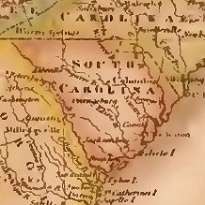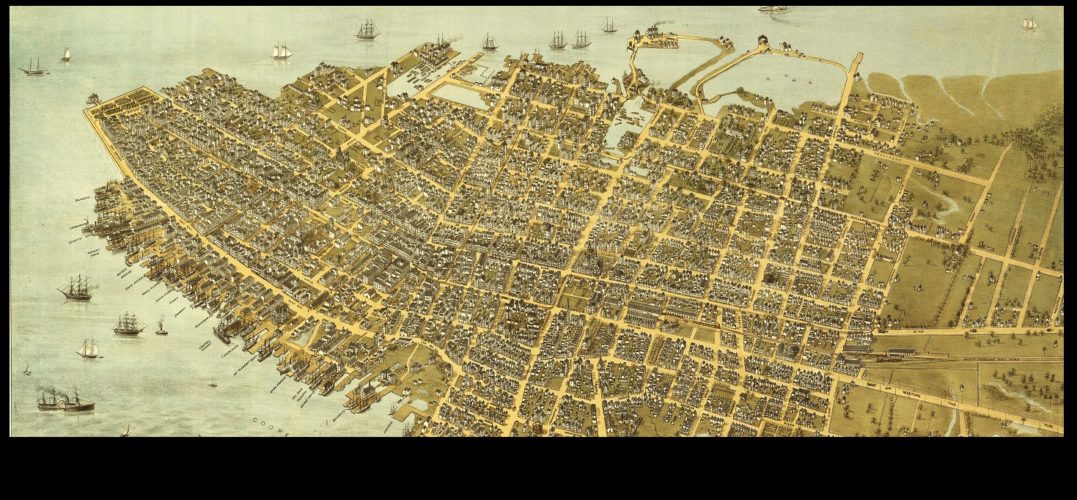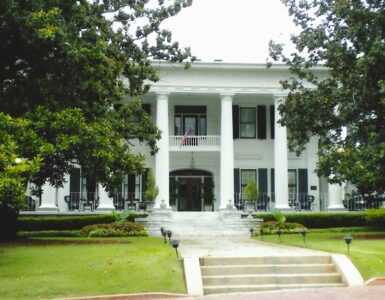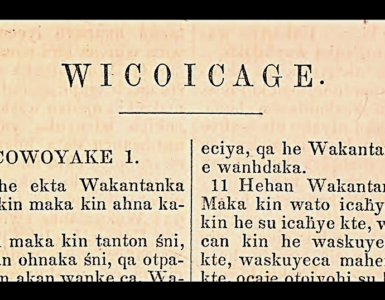
South Carolina is to American Presbyterianism as is Pennsylvania because Charleston and other harbors provided immigrants access to religious freedom and economic opportunities within the colony away from the English dominated coast. There are exceptions to the prevalence of the Church of England such as First Scots Church in Charleston and in other cities such as Beaufort and Georgetown. The Crown sometimes allotted plots to dissenting churches alongside the Church of England. In Pennsylvania, Scotch-Irish immigrants made their way west from Philadelphia then down the Shenandoah Valley distributing themselves in Virginia and North Carolina, then on into the Upcountry of South Carolina. Presbyterians distributed themselves from the outer regions to the geographic center of the state at Columbia which is the political capital and in the nineteenth century was the hub of state Presbyterianism having a seminary, an influential First Church, and faculty at South Carolina College (University). There were also Highland Scots immigrants in South Carolina just across from their primary settlements in the area between Fayetteville and Wilmington, North Carolina (for example Scotland County). Also, both the Covenanters and Seceeders were represented in the state with the former settling in the north-central part with William Martin their minister in the mid-eighteenth century, and currently the latter are the Associate Reformed Presbyterian Church. The two strongest colonial Presbyterian regions were South Carolina and Pennsylvania (maybe Virginia for a third).
During the last seven years various articles about Presbyterians in South Carolina have been posted. What follows is a catalog of these posts, each with a brief description of the content. Most of the collection is directly related to South Carolina but some entries are about other subjects that include a paragraph about a person, place, or thing within the state. The headings are: Huguenots, Places, Book Reviews, Reference, and by far the largest, People. All entries are linked to their respective posts. The dates are those the articles were posted; the entries under each heading are ordered by date. For books to read see the notes at the end of articles which include sources used and recommended sources. The Huguenots are included because they were a Reformed confessional church, with a form of presbyterian ecclesiology, but beside that, they simply interest me because they were an industrious lot that assimilated well as French Americans often uniting with Presbyterian churches.
This year, 2023, is the fiftieth anniversary of the Presbyterian Church in America (PCA). Two founding teaching elders of the denomination, Paul G. Settle and Morton H. Smith, have memorials listed in this catalog. If we all knew more about our Presbyterian historical heritage, we would be better equipped to direct the PCA according to Scripture and the Westminster Standards.
Also on Presbyterians of the Past are the following articles about the PCA 50th anniversary:
“Presbyterian Church in America, 50th Anniversary, 2023,” posted January 6, 2023, considers background information leading to the first general assembly, some of the founders of the denomination, and how the name of the denomination was selected.
“South Florida Presbytery, 50th Anniversary of PCA,” posted February 3, 2023, tells about Daniel Iverson’s ministry founding Shenandoah Presbyterian Church in Miami, Florida, and gives history regarding the establishment of South Florida Presbytery.
“50th Anniversary PCA and OPC, Christianity and Liberalism, J. G. Machen,” posted May 29, 2023, rewinds to an article published about J. Gresham Machen’s Christianity and Liberalism in 1985 and looks to the possibility of the PCA and Orthodox Presbyterian Church (OPC) becoming one denomination.
The map of South Carolina shows the hotly contested issue of the boundary with North Carolina. Later maps are different, but then maybe it is just a poorly drawn map.
Barry Waugh
Huguenots
“Florida Huguenot Trail,” July 26, 2022, provides a guide to extant Florida Huguenot sites and connects them in some cases to the Huguenot history of South Carolina.
“James F. Gibert, Huguenot Presbyterian Minister,” July 14, 2022, provides a biography of a Presbyterian minister of Huguenot descent that ministered in the Abbeville region of the state and quotes from a digitized version of John Lawson’s A New Voyage to Carolina; Containing the Exact Description and Natural History of that Country: Together with the Present State thereof. And a Journal of a Thousand Miles, Travel’d thro’ several Nations and Indians. Giving a particular Account of their Customs, Manners, &c, London, 1709.
“David Xavier La Far, 1826-1897,” January 17, 2017, was born in Charleston, attended the College of Charleston, and pastored several churches in South Carolina. He is buried in the cemetery beside the Huguenot Church in Charleston.
“André Guillebeau, Jean Louis Gibert, & the New Bordeaux Huguenots,” July 9, 2017, provides some history of the Huguenot (French Reformed) Christians that founded New Bordeaux settlement and influenced other regions of the state.
Places
“Smyrna Presbyterian Church Robert McLees, 1820-1866,” April 13, 2021, tells the congregations story after an introduction about the Smyrna Church recounted in the New Testament book of Revelation, chapter 2. McLees was born in Anderson County and after study at Columbia Theological Seminary he pastored several churches.
“Salem Presbyterian Church,” March 9, 2021, is in Blair. The article includes information about ministers serving in government work. The issue came before the General Assembly in 1806 via the case of Boyd Mercer of the Presbytery of Ohio, then in 1807 South Carolina Samuel Yongue’s work in government was interfering with attendance to his pastoral ministry.
“Friendship Presbyterian Church William McWhorter, 1811-1884,” February 22, 2021, McWhorter was pastor of the church for over thirty years and biographical information is provided. The church is about ten miles outside Laurens.
“Old Jackson Creek Church and Cemetery,” December 31, 2020, the church was founded about 1775 and this article tells about the ruins and cemetery. About the time a new church was constructed in 1893, the name was changed to Lebanon Presbyterian Church.
“Liberty Springs Presbyterian Church,” November 6, 2020, is located in Cross Hill and this article provides a history of the church from its organization in 1787. As was common in the state, the church most often was served by stated or occasional supply ministers due to a lack of funds for a pastoral call.
“Chicora College for Women,” March 13, 2020, was founded by Presbyterians in Greenville. The article provides a brief history; a flow chart of its development and relocations; and a promotional pamphlet when it was in Columbia, as well as a nice picture of the Columbia campus.
“Fairview Presbyterian Church, South Carolina,” March 1, 2020, is Greenville County’s oldest Presbyterian church. The building dates to 1858 and on the property is a cemetery. It is marked with a state historical marker.
“Bethel Presbyterian Church, Clover, SC,” May 20, 2019, was organized in 1764 and its first minister was Hezekiah Balch. The church was supplied by a number of minsters for years until its fifth pastor, R. A. Webb, served six years before entering education.
Book Reviews
“Review, Selected Writings of Benjamin Morgan Palmer, Willborn & Cangelosi,” February 19, 2015, is a collection of brief article by Palmer as published in a newspaper. Palmer’s ministry was primarily in New Orleans, but he was also a professor at Columbia Theological Seminary.
“Review, Our Southern Zion: Old Columbia Seminary, David B. Calhoun,” presents Dr. Calhoun’s history of the seminary from 1828 to 1927.
Reference
“A Year in Greenville, South Carolina, 1893,” January 31, 2022, includes items of note from my reading of The Greenville Mountaineer on microform for 1893. Included are local and national points of interest such as the opening of Clemson and an accident on campus, the World’s Columbian Exposition, the battle between gold and silver for hard money standard of the nation, and an account of a terrible hurricane in Charleston.
“Resource for Old Church Photographs,” January 13, 2022, includes information about South Carolina available through the Federal Writers Project as published in a guide in 1941.
People
“James F. Armstrong, Chaplain & Peacetime Pastor,” June 16, 2022, mentions Armstrong’s venture into the state during the Revolution and provides information about the presbyteries of the Synod of the Carolinas from the minutes of the 1804 General Assembly.
“Samuel Blatchford, Immigrant Pastor & Educator,” April 15, 2022, relates information about South Carolinians imprisoned in England during the Revolution, and organization of the Synod of South Carolina, by the 1813 General Assembly.
“George G. Mayes, South Carolina Princetonian,” December 10, 2021, was born in South Carolina with his entire ministry in the state with his last calls in the area of Winnsboro.
“Joseph Clark, The Carpenter’s Carpenter,” December 3, 2021, includes comments from the minutes of the 1800 General Assembly about admission to the judicatory of The Presbytery of Charleston.
“Charles A. Stillman, 1819-1895,” November 3, 2021, Stillman was born in Charleston. The biography includes an account of a group of South Carolinians that settled along the Black Warrior River in Alabama.
“Joseph Alexander, William C. Davis, and Bullock Creek Presbyterian Church,” June 28, 2021, tells of the founding of the church by Alexander and the controversial minister, Davis, who succeeded him. His The Gospel Plan, led to him founding the Independent Presbyterian Church with some like-minded congregations supporting his views.
“Aaron W. Leland, Congregationalism and Grassroots Presbyterianism,” May 26, 2021, provides a biography of Massachusetts-born Leland and his influential work for South Carolina Presbyterianism.
“Donald J. Auld, 1810-1857,” March 23, 2021, was born on Edisto Island and while a medical doctor became a Christian and then ordained to serve churches in South Carolina. This is a particularly interesting story.
“William A. McDowell, 1789-1851,” October 17, 2020, was born in New Jersey but moved to Charleston to become the first pastor of Third Church, which would become Central Church in 1852. He was selected a professor at Columbia Theological Seminary in 1832 but turned down the position.
“Moses Waddel, 1770-1840,” August 21, 2020, was born in North Carolina, but his ministry would be in South Carolina. While pastoring, he founded the Willington Academy in the state remaining there until 1819 when he accepted the presidency of what is now the University of Georgia.
“Andrew Flinn, 1773-1820,” July 17, 2020, attended James Hall’s Ebenezer Academy on the Bethany Presbyterian Church property near Statesville, North Carolina. He was the first pastor of Second Church, Charleston.
“Robert E. Allen, 1857-1909,” February 20, 2020, and his brother Herbert operated a grocery store in Greenville. He was also a deacon then an elder in Presbyterian churches.
“Edwin Cater, 1813-1882,” February 12, 2020, was born in Beaufort County. He married Sarah, the daughter of his professor at Columbia Seminary, Aaron W. Leland. He ministered in South Carolina, Mississippi, Louisiana, and Florida.
“Lectures about Thornwell,” January 27, 2020, this article refers to one in The Confessional Presbyterian, 2013, which included an entry, 79-102, about addresses remembering the centennial of Thornwell’s death.
“Robert Mills, 1781-1855,” December 6, 2019, was the architect of the Washington Monument, but the amount of work he accomplished in his native South Carolina is astonishing. Despite his mass of work, he struggled with poverty. He was a ruling elder in the Presbyterian Church.
“Zelotes L. Holmes, 1815-1885,” November 11, 2019, with a name like Zelotes, how could he not be interesting? He was born in New York, but moved to South Carolina because of health challenges. A fascinating guy whose interests were varied.
“Alfred H. Mathes, 1828-1878,” September 14, 2019, was born in Greenville, but went to seminary at Princeton, New Jersey, but served churches in Georgia and Florida.
“William P. Jacobs, 1842-1917,” August 5, 2019, was born and educated in South Carolina. He pastored for forty-seven years First Church, Clinton, founded Thornwell Orphanage, and was essential to the founding of Presbyterian College.
“Robert H. Reid, 1821-1907,” July 20, 2019, was born and educated in South Carolina; founded schools in what came to be Reidville; and was minister of Nazareth Church for over forty years. When writing this I concluded he worked hard and faithfully, but did not care for the public eye. A good man, indeed.
“John Witherspoon, 1791-1853,” June 13, 2019, was grandson of the John Witherspoon. One of his aunts was the wife of David Ramsay who wrote an important history of the state. John was a prominent but troubled minister; possibly, living in the shadow of his grandfather was hard to handle. His ministry was primarily in North and South Carolinas.
“Andrew F. Dickson, 1825-1879,” April 22, 2019, was born in Charleston and graduated from Yale University. He taught in several capacities until he joined Charles Stillman at what is currently Stillman College.
“Wesley F. Martin, 1850-1915,” December 7, 2018, was a member of a Presbyterian church in Greenville, a member of the Greenville Volunteer Fire Department, and he left textile mill work to be a trolley motorman.
“Edward P. Davis, 1851-1937,” May 21, 2018, was born in North Carolina but mostly served churches in the Carolinas. All four of his daughters graduated Chicora College. He was clerk of Enoree Presbytery for several years.
“Samuel R. Preston, 1849-1929,” April 5, 2018, studied in King College and Columbia Theological Seminary. His first call was in Florida, and other states ministered in were Virginia and South Carolina.
“Remembering Paul Settle, 1935-2018,” March 20, 2018, is a memorial for Pastor Settle who not only pastored but also was important for the founding of the Presbyterian Church in America (PCA) established in 1973. He was the first chairman of its Committee on Christian Education.
“A Lesson from Morton H. Smith, 1923-2017,” December 4, 2017, is a memorial for Dr. Smith which recounts his ministry. In this year of the PCA’s 50th anniversary, Dr. Smith as well as others who made sacrifices to establish a Bible centered and confessional Presbyterian church should be remembered.
“One Lord, One Faith, One Baptism,” James Woodrow, 1902, June 3, 2017, provides a brief biography of Woodrow that introduces a PDF download of “One Lord, One Faith, One Baptism.” Woodrow was a controversial figure whose views on science and evolution resulted in his removal from the faculty of Columbia Theological Seminary.
“Colin McIver, Salkehatchie Presbyterian Church,” August 24, 2016, provides a biography of McIver and an account of the Salkehatchie Church. He supplied and pastored a number of churches in the Carolinas.
“James H. Thornwell and Waxhaw Presbyterian Church,” August 8, 2016, provides biographical information and an account of his early church ministry.
“Flournoy Shepperson, 1883-1966,” April 22, 2016, was a minister of the Presbyterian Church in the United States (PCUS) who served churches in Arkansas and South Carolina. He was an associate of Carl McIntire and important for founding the Bible Presbyterian Church. He is buried in Greenville.
“Robert Means, 1796-1836,” February 12, 2016, tells of a gifted minister who suffered health problems leading to his death at the age of forty. I discovered him through purchase of a book written by him that I found in a used bookstore in Beaufort, South Carolina.
“Ellison A. Smyth, 1847–1942,” May 14, 2015, was the son of Rev. Thomas Smyth, pastor of Second Church, Charleston. He was important for the state’s textile industry and a Presbyterian elder.
“George Howe, 1802-1883,” December 11, 2014, was a professor at Dartmouth College before becoming a professor at Columbia Theological Seminary for over fifty years. He wrote a two-volume history of Presbyterians in South Carolina.
“Thomas Smyth, 1808–1873,” February 27, 2014, tells of the minister born in Belfast, Ireland, who served Second Church in Charleston for nearly forty years. His corpus is massive filling ten thick volumes.
“William S. Plumer, 1802-1880,” December 6, 2013, was born in Pennsylvania and ministered there as well as in the southern states. My impression is he could get along with those whose views differed from his, and he was the type of minister that just about anyone would have liked. He was moderator of the Old School Assembly, 1838, and then of the PCUS Assembly in 1871.





